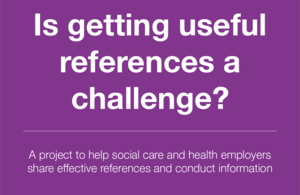Is getting useful references a challenge?
A project to help social care and health employers share effective references and conduct information.

Decorative image that reads 'Is getting useful references a challenge?'
The Disclosure and Barring Service (DBS) is collaborating with a number of safeguarding partners to hold a consultation about safer recruitment practices, references and conduct information within the social care and health sector.
Working alongside Skills for Care, Reed Screening, Dominic Headley & Associates, and VBA Consulting, our aim is to develop resources which will provide social care employers with the guidance, knowledge and tools to allow them to share accurate and relevant information about individuals with prospective employers – and with DBS, when appropriate.
Background
Gathering effective references for staff working in social care and health settings has always been an essential part of safe and fair recruitment, but many employers experience challenges in obtaining and providing them. Some employers refuse to complete references, others provide insufficient information and sometimes, appropriate ‘evidence of conduct’ is not provided, which is legally required by the Care Quality Commission.
Temporary arrangements put in place due to COVID-19, including the introduction of our 24-hour emergency Barred Lists checks, have resulted in an increased need for satisfactory social care references, and evidence of conduct. Our COVID-19 Barred Lists checks allow individuals working in eligible roles to commence employment prior to receipt of the full DBS certificate, so references and other elements of safe recruitment are essential.
Consultation and workshops
In light of the above, DBS is working with the above-mentioned partners to hold an online consultation and several workshops which will then inform the development of a number of resources – all of which aim to assist social care and health employers where references and evidence of conduct are involved.
The workshops will:
- provide further information about the project
- examine the barriers and challenges that employers face in gathering and providing references and evidence of conduct
- look at any ideas that participants have for improving referencing within the social care and health sector, or any practices that currently work well within their organisation
Each session will include case study scenarios for participants to explore that will highlight some of the key issues we are trying to address.
Executive Director of Barring and Safeguarding, Dr Sue Smith, says:
Effective evidence of conduct and references are part of a basket of measures that are key for safer recruitment within the social care and health sector, and we understand the difficulties that employers sometimes face in providing and obtaining this essential information. We are working together with Skills for Care, Reed Screening, Dominic Headley & Associates, and VBA Consulting, to develop these resources and workshops so we can provide employers with the tools they need to support them during recruitment and ongoing employment, and in doing so, continue our work within the safeguarding community to make recruitment safer.
Dates and times of the workshops are as follows:
| Date | Time |
| Wednesday 13 January | 12:30 to 15:00 |
| Thursday 21 January | 12:30 to 15:00 |
| Wednesday 3 February | 12:30 to 15:00 |
Register your interest in a workshop
To find out more about this consultation, or register your interest in a workshop, please email dominic@dominicheadleyassociates.co.uk.
Survey
As part of this consultation, we are asking organisations within the social care and health sector to take part in a short survey, which focuses on how they currently obtain and provide references, their understanding of references and the part they play within recruitment, and what they would like to gain from this consultation. This survey can be found here.
Updates to this page
-
Article updated with dates and times of the workshops.
-
First published.